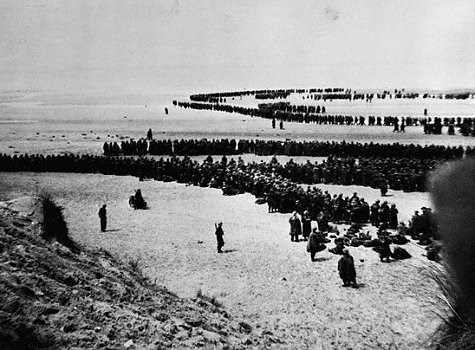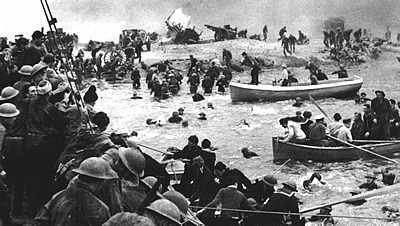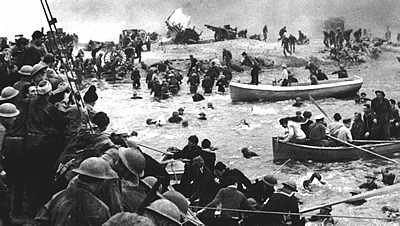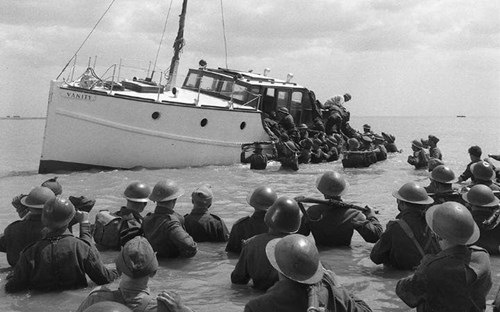Critics are already calling it the best film of the year. Everywhere I have gone this week literally everyone is talking about Dunkirk! Whether it’s colleagues in the office, clients in workshops or fellow travellers on the train, it’s the hot topic so I thought I’d take the opportunity to treat myself to a bit of time out and took myself off to the cinema.
I had given very little thought to the storyline other than it was a significant event in the history of our country and so I settled in the comfy seats with my popcorn and soft drink at the ready, waiting for the lights to go down. The picture begins - a story about the events of late May 1940 where allied soldiers from Belgium, the British Empire and France are surrounded by the German army and evacuated during a fierce battle in World War II.
As the film began, we soon witnessed the enormity of the task. Within minutes, the picture on the screen showed rows and rows of soldiers standing patiently and looking out to the sea and the skies ahead of them with one thought and one thought only…home. It struck me at that very moment: each and every person was connected and committed to a vision and a purpose and they knew the role they played within that. Their ‘why’ was to protect our freedom and our liberty, and they were willing to do whatever it took to achieve that. I have always respected our armed forces but even at this early stage of the film, I felt humbled not just by their willingness to serve but by their unreserved commitment to both the mission and the vision.

As someone who works with organisations and teams of people every day, it struck me that there were 400,000 men on that beach, (I am reflective that at that moment in time, we did not have women serving on the front line, although they played their part in so many other ways). It was the biggest team you could imagine and yet one of the most highly functioning teams you could ever hope to have.
It struck me that the thing that set them apart was their one common vision - a purpose that they believed in. They were passionate about their vision and they were prepared to fight for it. I was left sitting thinking, there is so much that we can learn from Dunkirk, that we can apply to now…so much learning that organisations and communities can benefit from, that would free people to be able to connect and contribute in a different way. I sat there thinking: ‘we need the Sprit of Dunkirk now, more then ever before’.
I should say that many of the teams and organisations that I work with are in the public sector, mainly in the NHS and social care sectors. They are facing enormous challenges, not on the scale of Dunkirk, but I am sure that many of them feel like those men did on the beaches - trapped and surrounded, being forced to retreat. They have very little control over some of the external factors that have got us where we are today and that are driving our tomorrow. The strategy of Dunkirk was a success from failure; it was one of our biggest success stories. It was leaders being brave enough to say ‘we need to get to a place of safety so we have a chance to regroup, to set a new strategy and to go again to achieve the vision.’ At no time did anyone lose sight of the vision. They just knew that to achieve it, they needed to do something different.
I sat thinking about some of the teams that we are working with. The face a fight for survival – they are not fighting people as such, but instead they are fighting austerity, lack of budget, increased demand and an ever-changing landscape. They feel trapped on all sides, trying to defend the services that they have and struggling to understand how they can make this work.


Without doubt, their challenges will never be on a scale close to Dunkirk; that was unprecedented and something I hope we never have to face as a nation again. However, the same feelings exist in organisations today, just on a different scale. I was gripped by the Spirit of Dunkirk and over the last week, I have sat on many occasions and thought ‘what can we learn from Dunkirk that can have an impact today?’ For me, there are a few key learnings that, if adopted, can transform organisation today:
- Everyone on that beach had signed up to a clear ‘WHY’. As part of that, they knew that no matter what, the mission at that time was to get everyone home, whether that be by carrying the wounded on stretchers, building temporary piers out of abandoned vehicles or standing in line and waiting patiently with their battalion, they understood what they were there to do and they did it.
- They had clear leadership that they respected. The leaders led from the front but also were the ones that stayed back. Their thought processes were agile and outcomes focused. There was no 5 year forward view strategy to follow; they had the autonomy to make decisions on the front line and they had the trust from the men on the beaches who followed them.
- They mobilised the people like never before – accepting the enormity of the challenge, they didn’t just look at what the armed forces could do. The navy and RAF mobilised people like you and I. Ensuring they were aligned to the ‘WHY’ and that they understood the mission, they mobilised 800+ small boats, because these boats could reach people far more effectively than any frigate, battle ship or destroyer could. They were agile, could change course faster and could get closer to people than any large boat ever could. Armed with a clear directive and an outline plan they set sail, knowing what they needed to do but with the autonomy to make decision for themselves, as long as they helped to achieve the mission.
These are three simple principles and actions, yet they are the difference between success and failure. There is so much to learn from Dunkirk and I will add detail to all these three points in follow up blogs over the next weeks.
It’s important to understand that the initial aim was to get 30,000 - the navy and army hoped for 45,000 of the 400,000 men home. I immediately felt disappointed that Churchill set the bar so low, and then realised that this truly was the enormity of the challenge!

By connecting people to a very clear ‘WHY’, leading them with passion, determination and absolute skill and empowering people to be involved like never before, they didn’t just bring 30,000 men home, they brought 324,000 men home.
If this can be achieved in such desperate times, then what could we achieve as organisations if we just applied the same thinking and principles.
- Everyone signed up to a clear ‘WHY’ - one that belongs to them.
- Give clear leadership that knows how to serve.
- Mobilise people like never before.
We need the spirit of Dunkirk to carry our country through the present challenges:
- We all need to be connected to a vision we believe in and that we will fight for
- We need to understand the part we can play and be prepared to play it, knowing that if we don’t, we will have a detrimental impact on the vision
- We have to develop and grow leaders who will be respected and trusted and who people will want to follow
- We have to mobilise ‘the small boats’, whether that be teams, communities, families etc. - helping them to connect to our vision and giving them the plan with the autonomy to help us achieve the vision.
So the question to end on is: “Can our organisations develop Dunkirk Spirit?”
At ICE, we believe that they can, and we would love to hear you views too…
- Rachel Stamp
 collective voice
collective voice